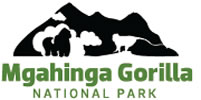For generations, Mgahinga’s thick forests were a haven to the native Batwa people who were hunter-gatherers and Warriors who relied in the Forest for their entire livelihood (shelter, medicine and food). They were very comfortable with their life much as they were perceived as primitive, and were identified as the “people of the forest” When Mgahinga was created into a National park in 1991, the Batwa were forcefully evicted from the Forest with nowhere else to go but to live low-impact Nomadic lifestyle. Imagine what it feels like to be evicted from your own home; this is the distress that these people went through. The only time they were allowed to re-enter their once adored home is as guides during the Batwa trail. While on the Batwa trail, tourists get to discover the mystery of the Batwa’s Ancient home while relishing the invigorating nature walks and get to learn about their rich cultural heritage.
These People demonstrate their ancient hunting skills, how they used to gather honey from the forest, identify some of the medicinal plants with the diseases they treat. Here the walk involves visiting the Traditional herbalist who uses local herbs to treat common ailments such as malaria, diarrhea and illnesses related to fertility. The Batwa trail also illustrates how bamboo cups are made and hilariously you will enjoy how fire is made by rubbing two sticks together.
This Batwa trail also leads tourists to the Sacred Ngarama Cave (once a hiding place for the Batwa, a store, residence of the former Batwa King and a former meeting place), where the women of the village perform in sad/sorrowful songs that echo mysteriously around the depth of the Dark Cave and leaves the tourists with a touching sense of the richness of their ignored and fading culture.
This interesting Batwa trail costs $80 per person, and part of this Fee goes to the guides and singers who perform during the trail and the rest goes to the Batwa Community fund to cater for school fees and scholastic materials such as books and also improve their Standard of living. For more information about this Trail and for bookings, call +256 312 355000 or +256 414 355000 or send an email to info@ugandawildlife.org or check out the Batwa Trail, to experience the culture of the Batwa People.
